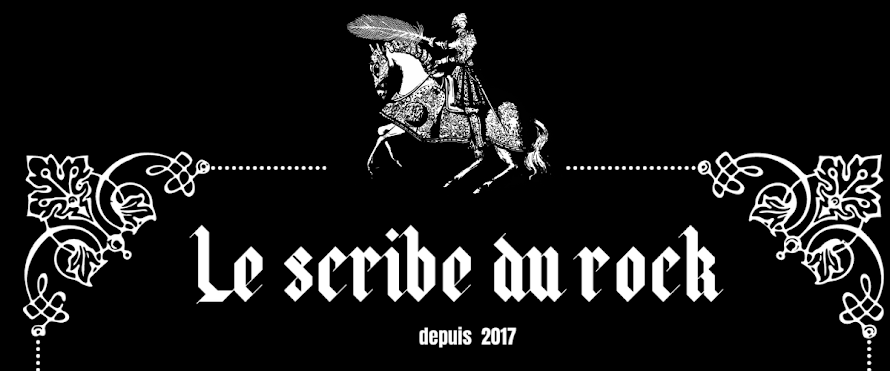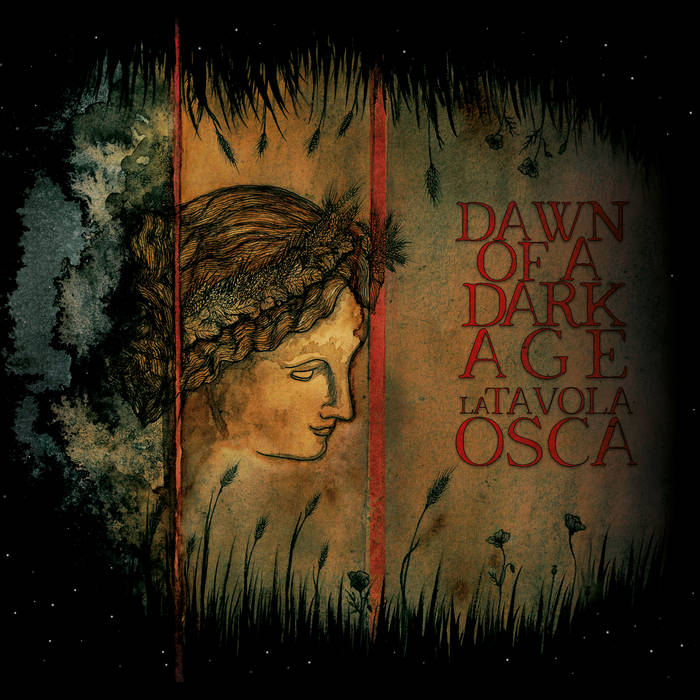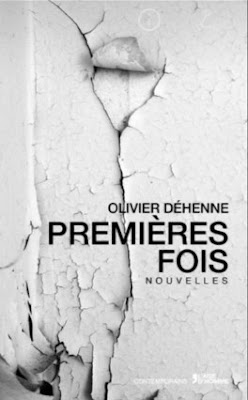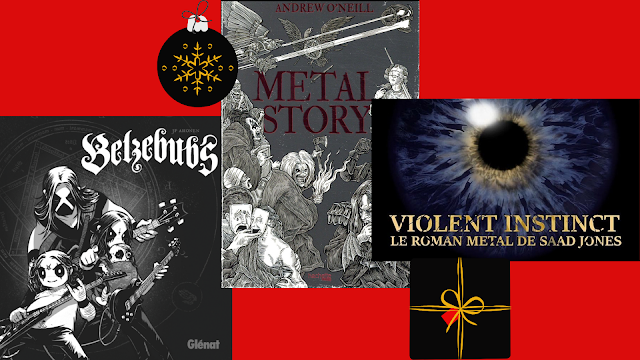This year Le Scribe du Rock Scribe will not have an annual Top as was the case in 2018 and 2019. The ending year was too negative to celebrate it in any way. Nevertheless I can tell you that Dawn Of A Dark Age's album, La Tavola Osca, released this year by Antiq, is one of this year's flagship albums when it comes to extreme metal. We have to add to this that the band doesn't limit itself to black metal or any other kind of extreme metal, but has also introduced a lot of jazz, prog, classical and other elements into its music.
A great record, which you can find the review here : https://www.webzinelescribedurock.com/2020/09/review-fr-english-dawn-of-dark-age-la.html
An interview in which we go back to the origins of the osque tablet and the samnites, but also talk about John Zorn, Slayer or Led Zeppelin... An interview full of information, absolutely fascinating!
"Always in music and in life I have only one rule that has accompanied me for decades: Do what thou wilt, so let it be (Aleister Crowley)"
Interview with Vittorio Sabelli (all instruments)
Hello Vittorio. Welcome to le Scribe du Rock. Can you please introduce Dawn Of A Dark Age to our readers?
Hello to all readers of Le Scribe du Rock and thanks for the invitation. Dawn of a Dark Age is my main project and was born from wanting to insert my main instrument, the clarinet, into extreme music. So the desire to use a new color and new influences ranging from jazz to chamber music to the avant-garde. The project was born in 2014 and since then I have recorded six discs: a saga called The Six Elements and the latest 'The Osca Table', released last July by Antiq.
Let's talk about la Tavola Osca. When did you begin to take an interest in this story dating back to 300 BC? Why the Samnites and the Osque Tablet?
The premise is important: I was born in Agnone, a few kilometers from where the Table was found (near Fonte San Nicola, near Capracotta) in 1848, and a few kilometers from where the word Italia was born (in Pietrabbondante, in the Sanctuary of the Nation Samnite, where the Italic peoples swore their alliance in the name of freedom and equal rights), in Osco Viteliù. A few years ago the writer Nicola Mastronardi invited me to an exhibition on La Tavola Osca and the mysteries that still surround it after more than 2300 years. Asking him if there was any musical work on the Samnites, he replied: "The time has come for it to be dedicated to them." Looking at the object in the display case where it was exhibited, in an almost hypnotic way it took me back in time, and it didn't take much to turn on the switch that I had decided to turn off with Spirit / Mystères.
The Osca Table is the only official document we have regarding the religious sphere of the Samnites, and it will certainly be the first disc of a series dedicated to their stories, their heroic deeds and their history that is re-emerging over time, just like ancient excavations.
This album is ambitious, mixing black metal and progressive influences, flute and distortion, jazz and metal. How did you gather these various influences?
Everything you hear in my music is the result of my experience from when I was playing in a band at the age of 10 up to the Symphony Orchestra and Jazz projects. All put at the service of the love I have for extreme music. Naturally the curiosity to discover new and unexplored areas is the first component for DOADA.
By the way, which are the musicians and the music that influence you the most?
As mentioned before, I don't have real influences, but bands and composers who leave you 'something inside' in the course of life. I could tell you Brahms, Miles Davis, Ornette Coleman, but also Led Zeppelin, Slayer, Dead Kennedys and Pink Floyd. The important thing is not to go into it too deeply, otherwise you run the risk of emulating them and appearing 'their' and resembling them too much. The right love but with the right detachment to keep the project and the sound as unique and native as possible, for better or for worse.
If I tell you John Zorn, Devin Townsend and Ihsahn, does it evoke something to you?
They have in common the experimentation and the curiosity of a continuous musical research. I can tell you that thanks to Zorn I started exploring with the clarinet still virgin environments. When Naked City came out I remember I was literally shocked, and I had already listened to Napalm Death and Slayer for some time, but the fact of inserting a sax in the Grindcore field and the way of thinking about other people's songs (like The Sicilian Clan by Morricone) in that way has me completely opened the doors wide for what I had been looking for for years, that is to insert the clarinet in metal, but never finding solutions that convinced me before DOADA. And then Zappa…
How long did it take you to work on such an album?
The Osca Table took me almost four years. Usually I work in shorter times but for the Table it was important to find historical sources from 2300 years ago, and therefore I waited the time necessary to tell this story without haste in the best way. A complex disc, but if 'studied' from a historical point of view you can get in touch with the Divinity engraved on the Table venerated by my ancestors, the Samnites and discover the extraordinary people that Iit was.
You had previously released a series of albums on the elements. Can you tell us about it?
The Six Elements was all about the number 6, from the number of songs to the six-monthly frequency of releases, up to 36 minutes in duration. The four natural elements, plus two more ethereal ones contained in the latest Spirit / Mystères. Each album has its own color, both as instrumentation and with the different singers (from Selvans, Enisum and the Finns Graveborne). The first three discs are a 'test' of the potential of the clarinet in Black Metal, from the IV onwards the project begins to have its own well-defined path.
If Dawn Of A Dark Age was a proverb, a quote?
Always in music and in life I have only one that has accompanied me for decades: Do what thou wilt, so mete it be (Aleister Crowley).
Are you already thinking about the next album? And if, can you tell us about it?
I'm already working on it, I can only mention that it will also be dedicated to the Samnites, but at the moment I can't go further...
Your favorite albums ever?
There is no particular album, I could always name at least one of each genre. I could tell you Led Zeppelin II because it is the first record I listened to, Rust in Peace for the construction of the songs and the uniqueness of Friedman's solos. The power and groove of Vulgar Display of Power or the unprecedented violence of the early Carcass. In the field of jazz Duke Ellington and Miles Davis, also among the greatest experimenters in history.
Blank space, add whatever you want:
Thank you for the time dedicated to DOADA, continue to support the project both on the Bandcamp page of the band and on that of Antiq, a courageous label that has embraced a risky project, but undoubtedly recognizable and unique of its kind.
THANKS DODA
Cette année le Scribe du Rock ne fera pas de Top annuel comme ce fut le cas en 2018 et 2019. L'année finissante a été trop négative pour la célébrer d'une façon ou d'une autre. Néanmoins je peux vous dire que l'album de Dawn Of A Dark Age, La Tavola Osca, paru cette année chez Antiq, est un des albums phares de cette année en matière de metal extrême. Il faut ajouter a cela que le groupe ne se limite pas au black metal ou a un autre genre de metal extrême mais a aussi introduit bon nombre d'éléments jazz, prog, classique et autres dans sa musique. Un grand disque donc, dont vous pouvez retrouver la chronique ici :
Parole aux intéressés pour une interview où l'on revient sur les origines de la tablette osque et des samnites, mais aussi où l'on cause de John Zorn, Slayer ou Led Zeppelin...Une interview riche en informations, absolument passionnante !
"Toujours dans la musique et dans la vie, je n'ai qu'une règle qui m'accompagne depuis des décennies : Fais ce que tu veux, ainsi soit-il (Aleister Crowley)"
Entretien avec Vittorio Sabelli (tous les instruments dans DOADA)
Bonjour Vittorio. Bienvenue au Scribe du Rock. Pouvez-vous présenter Dawn Of A Dark Age à nos lecteurs ?
Bonjour à tous les lecteurs du Scribe du Rock et merci pour l'invitation. Dawn of a Dark Age est mon projet principal et est né du désir d'insérer mon instrument principal, la clarinette, dans la musique extrême. Donc le désir d'utiliser une nouvelle couleur et de nouvelles influences allant du jazz à la musique de chambre en passant par l'avant-garde. Le projet est né en 2014 et depuis lors, j'ai enregistré six disques : une saga appelée The Six Elements et le dernier, La Tavola Osca, sorti en juillet dernier chez Antiq.
Parlons de la Tavola Osca. Quand avez-vous commencé à vous intéresser à cette histoire qui remonte à 300 avant J.-C. ? Pourquoi les Samnites et la tablette d'Osque ?
Les prémices sont importants : je suis né à Agnone, à quelques kilomètres de l'endroit où la Table a été trouvée (près de Fonte San Nicola, près de Capracotta) en 1848, et à quelques kilomètres de l'endroit où le mot Italia est né (à Pietrabbondante, dans le Sanctuaire de la Nation Samnite, où les peuples italiques ont juré leur alliance au nom de la liberté et de l'égalité des droits), à Osco Viteliù. Il y a quelques années, l'écrivain Nicola Mastronardi m'a invité à une exposition sur la Tavola Osca et les mystères qui l'entourent encore après plus de 2300 ans. En lui demandant s'il y avait une œuvre musicale sur les Samnites, il m'a répondu : "Le moment est venu de leur consacrer cette exposition". En regardant l'objet dans la vitrine où il était exposé, d'une manière presque hypnotique, il m'a fait remonter le temps, et il n'a pas fallu grand chose pour allumer l'interrupteur que j'avais décidé d'éteindre avec Spirit / Mystèrès.
La Table d'Osque est le seul document officiel que nous ayons concernant la sphère religieuse des Samnites, et ce sera certainement le premier disque d'une série consacrée à leurs histoires, leurs actes héroïques et leur histoire qui ressurgit au fil du temps, tout comme les fouilles anciennes.
Cet album est ambitieux, mêlant black metal et influences progressives, flûte et distorsion, jazz et métal. Comment avez-vous rassemblé ces différentes influences ?
Tout ce que vous entendez dans ma musique est le résultat de mon expérience depuis l'époque où je jouais dans un groupe à l'âge de 10 ans jusqu'aux projets avec un orchestre symphonique et du Jazz. Tout cela mis au service de l'amour que j'ai pour la musique extrême. Naturellement, la curiosité de découvrir des domaines nouveaux et inexplorés est le premier élément de DOADA.
Au fait, quels sont les musiciens et la musique qui vous influencent le plus ?
Comme je l'ai déjà dit, je n'ai pas de véritables influences, mais des groupes et des compositeurs qui vous laissent "quelque chose" au cours de votre vie. Je pourrais vous parler de Brahms, Miles Davis, Ornette Coleman, mais aussi de Led Zeppelin, Slayer, Dead Kennedys et Pink Floyd. L'important est de ne pas trop s'y attarder, sinon on risque de les imiter, de paraître "leur" et de leur ressembler trop. Le bon amour mais avec le bon détachement pour que le projet et le son restent aussi uniques et natifs que possible, pour le meilleur et pour le pire.
Si je vous dis John Zorn, Devin Townsend et Ihsahn, est-ce que cela vous évoque quelque chose ?
Ils ont en commun l'expérimentation et la curiosité d'une recherche musicale continue. Je peux vous dire que grâce à Zorn, j'ai commencé à explorer avec la clarinette des environnements encore vierges. Quand Naked City est sorti, je me souviens que j'étais littéralement choqué, et j'avais déjà écouté Napalm Death et Slayer depuis un certain temps, mais le fait d'insérer un saxophone dans le champ du Grindcore et la façon de penser aux chansons des autres (comme The Sicilian Clan de Morricone) de cette façon m'a complètement ouvert les portes de ce que je cherchais depuis des années, c'est-à-dire insérer la clarinette dans le metal, mais sans jamais trouver de solutions qui m'aient convaincu avant DOADA. Et puis Zappa...
Combien de temps vous a-t-il fallu pour travailler sur un tel album ?
La table Osca m'a pris presque quatre ans. Habituellement, je travaille en moins de temps, mais pour la Table, il était important de trouver des sources historiques datant d'il y a 2300 ans, et j'ai donc attendu le temps nécessaire pour raconter cette histoire sans précipitation de la meilleure façon possible. C'est un disque complexe, mais si vous l'étudiez d'un point de vue historique, vous pouvez entrer en contact avec la divinité gravée sur la Table vénérée par mes ancêtres, les Samnites, et découvrir le peuple extraordinaire qu'il était.
Vous aviez déjà sorti une série d'albums sur les éléments. Pouvez-vous nous en parler ?
The Six Elements portait sur le chiffre 6, du nombre de chansons à la fréquence semestrielle des sorties, jusqu'à une durée de 36 minutes. Les quatre éléments naturels, plus deux autres éléments plus éthérés contenus dans le dernier Spirit / Mystères. Chaque album a sa propre couleur, tant au niveau de l'instrumentation que des chanteurs (Selvans, Enisum et Finns Graveborne). Les trois premiers disques sont un "test" du potentiel de la clarinette dans le Black Metal, à partir de la quatrième, le projet commence à avoir sa propre voie bien définie.

Si Dawn Of A Dark Age était un proverbe, une citation ?
Toujours dans la musique et dans la vie, je n'ai qu'une règle qui m'accompagne depuis des décennies : Fais ce que tu veux, ainsi soit-il (Aleister Crowley).
Pensez-vous déjà au prochain album ? Et si oui, pouvez-vous nous en parler ?
J'y travaille déjà, je peux seulement mentionner qu'il sera aussi dédié aux Samnites, mais pour l'instant je ne peux pas aller plus loin...
Vos albums préférés ?
Il n'y a pas d'album particulier, je pourrais toujours en nommer au moins un de chaque genre. Je pourrais vous dire Led Zeppelin II parce que c'est le premier disque que j'ai écouté, Rust in Peace pour la construction des chansons et le caractère unique des solos de Friedman. La puissance et le groove de Vulgar Display of Power ou la violence sans précédent des débuts de Carcass. Dans le domaine du jazz, Duke Ellington et Miles Davis, également parmi les plus grands expérimentateurs de l'histoire.
Espace vide, ajoutez ce que vous voulez :
Merci pour le temps consacré à DOADA, continuez à soutenir le projet tant sur la page Bandcamp du groupe que sur celle d'Antiq, un label courageux qui s'est engagé dans un projet risqué, mais sans doute reconnaissable et unique en son genre.
Merci DODA !











